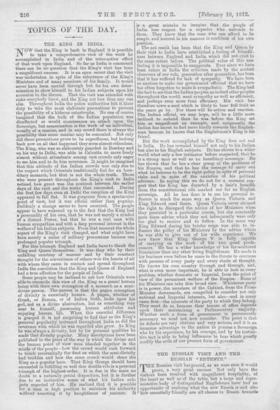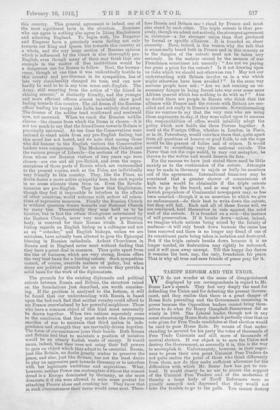THE RUSSIAN VISIT AND THE RUSSIAN "ENTENTE."
THE Russian visit has proved, as we were sure it would 1. prove, a very great success. Not only have the visitors been received with magnificent hospitality, of the heart as well as of the table, but a large and repre- sentative body of distinguished Englishmen have' had an opportunity of realizing what the new Russia is and also how essentially friendly are all classes in Russia. towards this country. This general agreement is indeed one of the most significant facts in the situation. Russians who can agree in nothing else agree in liking Englishmen and admiring England. To begin with, the Emperor and Empress have a genuinely warm feeling not only towards our King and Queen but towards this country. as a whole, and the very large section of Russian opinion which is influenced by the Court is also thoroughly pro- English, even though many of them may think that our example in the matter of free institutions would be a dangerous one for Russia to follow. Next, the bureau- cracy, though at one time it was undoubtedly hostile to this country and pro-German in its sympathies, has of late very considerably changed its tone, and can now hardly be said to be in any true sense anti-English. The Army, still smarting from the action of "the friend in shining armour," is distinctly friendly, and the younger and more efficient officers almost invariably show good feeling towards this country. The old dream of the Russian officer leading his troops into India has entirely died away. The dreams of the soldier tend southward and westward now, not eastward. When we reach the Russian middle classes—the classes from which the Duma is chosen—it is not too much to say that the friendliness towards Britain is practically universal. At one time the Conservatives were inclined to stand aside from any pro-English feeling, but this mood has not lasted, and we note that among those who did honour to the English visitors the Conservative leaders were conspicuous. The Moderates, the Cadets, and the various groups of Liberals—the sections of the Duma from whom our Russian visitors of two years ago were chosen—are one and all pro-British, and even the repre- sentatives of those parts of Russia which are unreconciled to the present regime, such as the Poles, are individually very friendly to this country. They, like the Finns, no doubt desire a more active sympathy here, but such regrets in no sense alienate them from us. Even the Revolu- tionaries are pro-English. They know that Englishmen, though they feel it impossible to interfere in the affairs of other countries, would welcome with ardour all relaxa- tions of repressive measures. Finally the Russian Church is without question drawn towards our National Church by many ties. Theoretically they may hold us to be heretics, but in fact the odium theologicum entertained by the Eastern Church, never very much of a. persecuting body, is reserved for their Roman rivals. A Russian bishop regards an English bishop as a colleague and not as an "outsider," and English bishops, unless we are mistaken, have actually been allowed to give (ho Episcopal blessing in Russian cathedrals. Ardent Churchmen in Russia and in England never meet without finding that they have a great deal in common. Thus quite apart from the ties of business, which are very strong, Russia offers the very best basis for a binding entente. Such sympathies cannot, of course, override matters of policy, but when there are political grounds for an entente they provide a solid basis for the work of the diplomatists.
The grounds for the existing diplomatic and political entente between Russia and Britain, the structure raised on the foundations just described, are worth consider- ing. If the problem is analysed to the bottom, it will be found that our understanding with Russia is based upon the bed-rock fact that neither country could afford to see France overwhelmed by her powerful neighbour. Those who have a common object of this kind must necessarily be drawn together. When two nations separately come to the conclusion that they must make even the supreme sacrifice of war to maintain that third nation in inde- pendence and strength they are inevitably driven together. The force of circumstances joins their hands. Both Russia and Britain feel that to maintain a position of isolation would be an utterly foolish waste of energy. It would mean, indeed, that they were not using their full powers to gain an object which they admit to be essential. Russia, just like Britain, no doubt greatly wishes to preserve the peace, and also, just like Britain, has not the least desire to play an aggressive part towards Germany or to interfere with her legitimate ambitions and aspirations. What, however, neither Power can contemplate without the utmost dread is a Europe dominated by Germany, as she must dominate it if she were allowed to seize some pretext for attacking France alone and crushing her. They know that in such circumstances their turns would come next. There- fore Russia and Britain rairt stand by France and must also stand by each other. The triple entente is thus pas- sively, though we admit not actively, the strongest agreement in existence—a far stronger union than that produced by formal or specific alliances. It is founded on sheer necessity. Here, indeed, is the reason why the talk that is occasionally heard both in France and in this country as to the dangers of the entente need not be taken very seriously. In the malaise caused by the menace of war Frenchmen sometimes ask uneasily : "Are not we paying too groat a price for the entente? Is it not drawing upon. us risks which we should not otherwise run? May not our understanding with Britain involve us in a war which might otherwise have been avoided ? " In the same way nervous people here ask : "Are we not running an un- necessary danger in being forced into war over some mere African quarrel which has nothing to do with us ? " Also no doubt there are people in Russia who think that the alliance with France and the entente with Britain are one- sided and not really in Russia's interests. Notwithstanding this we venture to say that the very men who are using these arguments to-day, if they were called upon to assume the responsibilities of office, would infallibly adopt the policy which now holds the three Powers together. A. week at the Foreign Office, whether in London, in Paris, or in St. Petersburg, would convince them that, quite apart from all questions of honour or good faith, to cut the rope would be the gravest of follies and of crimes. It would amount to something very like national suicide. The Power that cut the rope would, to vary our metaphor, be thrown to the wolves and would deserve its fate.
For, the reasons we have just stated there need be little anxiety as to the continuance of the entente. Attempts may be made in Germany to cajole or bully its members out of the agreement. International financiers may be convinced that a greater shower of commissions at high rates would be obtainable if the triple entente were to go by the board, and so may work against it. Jewish proprietors of Continental newspapers may, as has boon asserted—though it is an assertion to which we give no endorsement—do their best to write down the entente, but they will fail. Each and all of these forces will, we are convinced, hurl themselves in vain against the solid wall of the entente. It is founded on a rock—the instinct of self-preservation. If it breaks down—unless, indeed, we imagine whole nations being seized by the fatuity of madness—it will only break down because the cause has been removed and there is no longer any dread of one of its constituent parts being taken in isolation and destroyed. But if the triple entente breaks down because it is no longer needed, its destruction may rightly be welcomed, and it will pass away unwept. Till this happy day dawns it remains the best, nay, the only, foundation for peace. That is why all true and sane friends of peace pray for it.











































 Previous page
Previous page